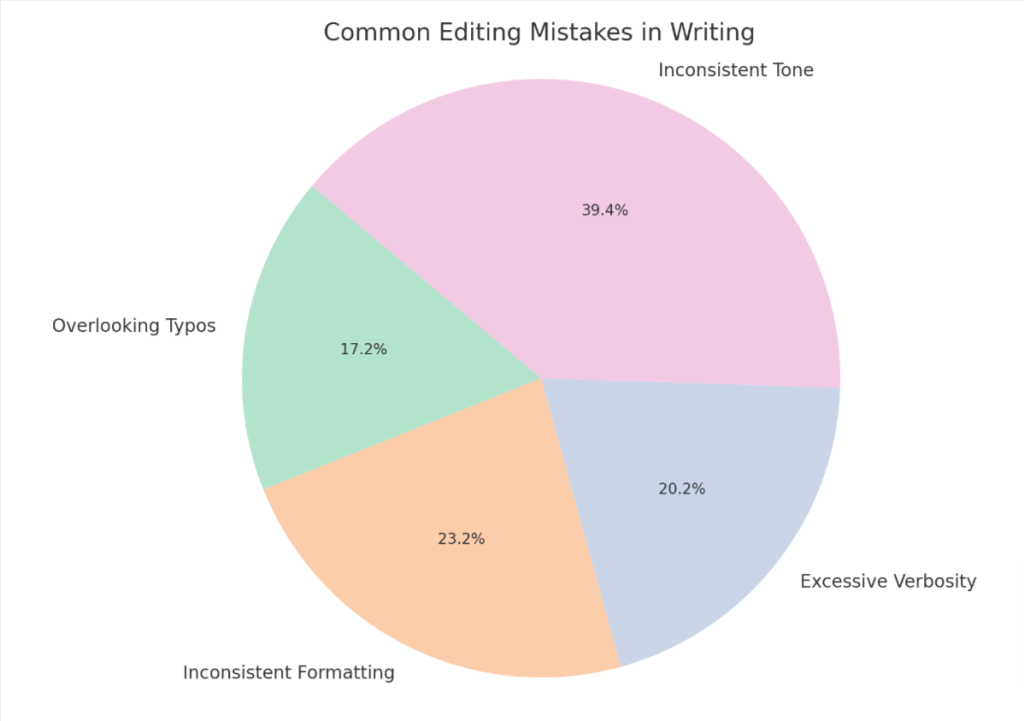Perfecting Your Prose: The Critical Role of Editing in Writing
Honing your craft as a writer involves more than just putting pen to paper; it’s also about refining and perfecting that initial draft. In fact, studies have shown that accomplished authors attribute 80% of their writing process to editing.
This blog will arm you with an array of effective tips and techniques for polishing your work, transforming it from good to exceptional. Ready for a writing upgrade? Dive in!
Key Takeaways
- Editing improves the readability and flow of your writing, making it easier for readers to follow and understand.
- Polishing your writing skills through editing enhances credibility and professionalism in your work, building trust with readers.
- Taking breaks, finding a healthy work – life balance, and staying mentally and physically healthy are essential for preventing burnout and maintaining productivity as a writer.
The Power of Editing in Writing
Editing is a crucial step in the writing process as it improves readability, enhances credibility, and adds a touch of professionalism to your work.
Improves readability and flow
Proper editing enhances the readability and flow of your writing. It aids in presenting thoughts and ideas more cohesively, making it easier for readers to follow the narrative. Editing helps remove unnecessary or repetitive words, ensuring that every sentence effortlessly transitions into the next.
This process does not just improve the reading experience but also enables your content to effectively convey its intended message. The reader shouldn’t struggle while deciphering meanings; instead, they should seamlessly glide from one point to another due to a well-edited piece.
Enhances credibility and professionalism
Polishing your writing skills through editing not only improves the readability of your work but also bolsters its credibility and professionalism. This process showcases a writer who pays attention to detail and strives for excellence, establishing trust with readers.
A meticulously edited piece of writing signals authority in a particular subject matter. It removes unnecessary distractions allowing your content to shine through clearly while underpinning your points effectively.
A fluid and error-free write-up conveys dedication, seriousness, and expertise that inevitably enhances reader’s confidence in the credibility of the written material.
The Importance of Self-Care for Writers
Taking breaks to prevent burnout, finding a healthy work-life balance, and staying mentally and physically healthy are essential for writers.
Taking breaks to prevent burnout
Burnout can creep up on writers who push themselves too hard. A sizzling idea or a looming deadline often fuels the desire to write non-stop, but that path leads nowhere good. Too much work with not enough rest can lead to mental and physical exhaustion—also known as burnout.
It’s vital to take regular breaks throughout your writing process. This could be as simple as standing up and stretching every hour or taking a short walk outside during lunchtime.
These pauses refresh your brain, reduce stress levels, and stave off fatigue, keeping you sharp and creative when facing the blank page again. Prioritizing breaks today ensures sustainable productivity for all your tomorrows in writing.
Finding a healthy work-life balance
Maintaining a healthy work-life balance is crucial for writers to prevent burnout and maintain their well-being. By setting boundaries between work and personal life, writers can avoid feeling overwhelmed and maximize productivity in both areas.

Taking regular breaks, engaging in hobbies or relaxation activities, and spending quality time with loved ones are essential for achieving this balance. Prioritizing self-care ensures that writers stay mentally and physically healthy, which ultimately enhances their writing skills and overall satisfaction with their work.
Staying mentally and physically healthy
Taking care of our mental and physical health is crucial for writers to maintain their productivity and creativity. Engaging in regular exercise not only keeps our bodies fit, but it also helps to clear our minds and reduce stress levels.
Additionally, finding time for self-care activities such as meditation or hobbies can improve focus and overall well-being. By prioritizing both our mental and physical health, we can ensure that we have the energy and clarity of mind needed to produce high-quality writing.
Tips for Effective Editing
Start by focusing on the big picture and make sure your content is well-organized and flows smoothly. Be ruthless in cutting unnecessary content to keep your writing concise and engaging.
Revise and rewrite as needed to improve clarity and ensure that each paragraph has a clear purpose. Pay attention to small details like grammar, spelling, and punctuation to enhance the overall quality of your writing.

Start with the big picture
To polish your writing skills, it’s crucial to start with the big picture. Begin by taking a step back and looking at the overall structure and organization of your piece. Ask yourself if the content flows smoothly and if each paragraph contributes to the main idea.
This bird’s eye view allows you to identify any gaps or areas that need improvement. By starting with the big picture, you set a solid foundation for refining your writing and ensuring that it effectively communicates your message.
Be ruthless in cutting unnecessary content
Cutting unnecessary content is a crucial step in the editing process. It involves removing any information or sentences that do not contribute to the overall message of your writing.
By being ruthless and eliminating fluff, you can ensure that your piece is concise, focused, and engaging for your readers. This helps to improve clarity and keeps their attention from start to finish.
Revise and rewrite to improve clarity
To improve the clarity of your writing, it is crucial to revise and rewrite your work. This process involves reviewing your draft and making changes to ensure that your ideas are communicated clearly.
By revising and rewriting, you can eliminate any confusion or ambiguity in your writing and make it easier for readers to understand your message. Look out for sentences that are too long or complex and simplify them.
Be sure to clarify any vague or unclear statements by providing additional details or examples. Through this process of revision and rewriting, you can refine and perfect your writing, ensuring that it is clear, concise, and engaging for your audience.
When you revise and rewrite to improve clarity:
– Look for ways to simplify complex sentences
Pay attention to small details
Pay attention to small details when editing your writing. These include checking for spelling and grammar errors, ensuring consistency in style and formatting, and refining sentence structure.
Focusing on these small but important details will help improve the overall quality of your work and enhance its professionalism. Don’t overlook the importance of paying attention to these finer points as they can make a big difference in the final product.
The Proofreading Process
During the proofreading process, it is important to meticulously check for any spelling and grammar errors, ensuring that your writing is error-free. Additionally, you should pay attention to consistency in style and formatting throughout your piece, making sure it adheres to any guidelines or style guides.
Seeking feedback from others can also be beneficial in identifying any areas that may need improvement.

Checking for spelling and grammar errors
Checking for spelling and grammar errors is a crucial step in the editing process. It ensures that your writing is clear, professional, and easy to understand. By carefully reviewing your work for mistakes, you can improve the overall quality of your writing and enhance its readability.
Correcting these errors will make your content more credible and avoid any confusion or misunderstandings for your readers. So take the time to proofread your work thoroughly before finalizing it to ensure accuracy and to present a polished piece of writing.
Ensuring consistency in style and formatting
Consistency in style and formatting is essential for creating a polished and professional piece of writing. By maintaining a consistent style, such as using the same font, margins, and spacing throughout your document, you can ensure that your work looks clean and well-organized.
Consistent formatting also extends to elements like headings, subheadings, bullet points, and numbering systems. When these elements are consistent throughout your writing, it helps guide readers and makes it easier for them to navigate and understand your content.
Additionally, consistency in style helps maintain the overall coherence of your message and enhances readability for your audience.
Seeking feedback from others
To truly polish your writing skills, it’s essential to seek feedback from others. By getting an outside perspective, you can gain valuable insights into the strengths and weaknesses of your work.
Others may notice things that you might have missed and offer suggestions for improvement. Whether it’s a fellow writer, a trusted friend, or an editor, their feedback can help you refine your ideas, clarify your message, and enhance the overall quality of your writing.
Don’t be afraid to ask for feedback; it’s an invaluable tool in honing your skills as a writer.
Conclusion
Editing plays a crucial role in polishing your writing skills. By improving readability, enhancing credibility, and ensuring accuracy, editing helps you produce high-quality content that captivates your readers.
So don’t underestimate the power of editing – it’s the key to perfecting your writing and making it shine.

